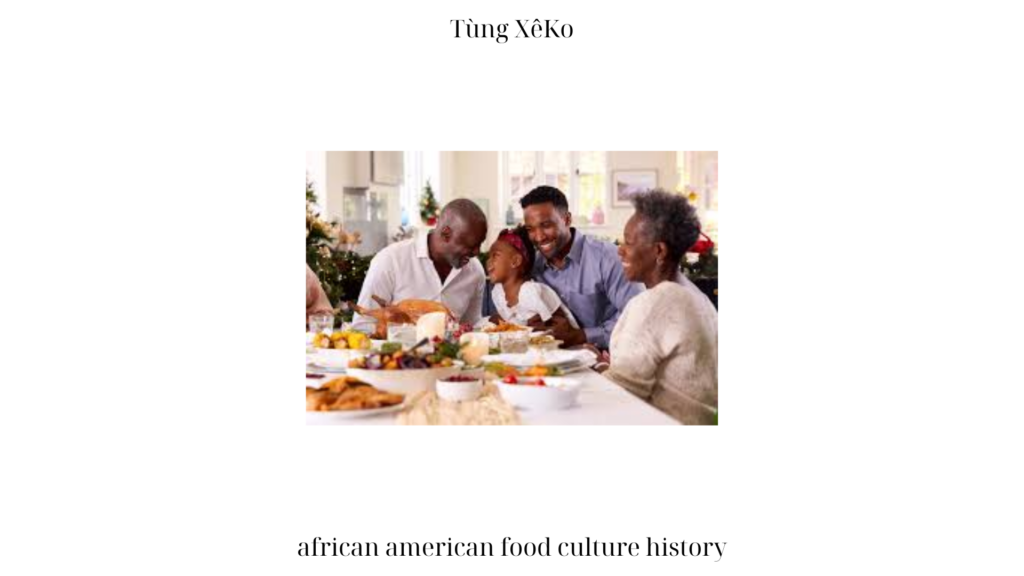Deeply rooted in the rich tapestry of African heritage and shaped by the unique experiences of the African American community, the culinary traditions of African Americans have long been a vital aspect of their cultural identity. From Tungxeko the forced migration of enslaved Africans to the ongoing celebrations of community and resilience, the story of african american food culture history is one that is both complex and profoundly meaningful.
African American Food Culture History: A Historical Exploration

To truly understand the significance of african american food culture history, we must delve into its historical origins and the ways in which it has evolved over time. The foundations of this culinary tradition can be traced back to the diverse food ways of the African continent, where different regions and ethnic groups developed their own distinct cooking methods and flavor profiles. When Africans were forcibly transported to the Americas as slaves, they brought with them a wealth of knowledge and techniques that would ultimately shape the foodways of the emerging African American community.
Adapting to the limited resources african american food culture history and harsh realities of plantation life, enslaved Africans utilized their ingenuity and resourcefulness to create dishes that not only nourished their bodies but also served as a means of preserving their cultural heritage. From the use of familiar ingredients like okra, yams, and peanuts to the development of unique cooking methods like slow-simmering and smoking, these culinary practices became a testament to the resilience and ingenuity of the African American people.
One of the most significant contributions of african american food culture history American food culture is the creation of “soul food,” a term that encapsulates a broad range of dishes and cooking styles that emerged during the era of slavery and endured through the Jim Crow era and the Civil Rights Movement. Soul food, with its emphasis on using every part of an animal, repurposing leftover ingredients, and celebrating the rich flavors of the American South, became a symbol of cultural pride and community.
Dishes such as collard greens, cornbread, african american food culture history chicken, and macaroni and cheese, which are now considered staples of American cuisine, have their roots in the resourceful and ingenious cooking techniques of enslaved Africans. These dishes, imbued with the memories and experiences of their creators, serve as a testament to the resilience and adaptability of the African American community.

As the African American community african american food culture history to evolve and assert its identity, the culinary traditions of soul food were joined by a diverse array of other culinary influences, reflecting the broader diaspora of the African continent. The influx of Caribbean, West African, and other global culinary traditions further enriched the tapestry of African American food culture, introducing new ingredients, flavors, and preparation methods.
The 1960s and 1970s saw a surge of interest african american food culture history and appreciation for African American cuisine, as the Civil Rights Movement and the Black Power movement brought greater attention to the cultural significance of this culinary tradition. Chefs, authors, and food historians began to document and celebrate the rich history and diverse expressions of African American food culture, underscoring its role in shaping the broader American culinary landscape.
Today, African American food culture continues to african american food culture history thrive and evolve, with a new generation of chefs, home cooks, and food entrepreneurs championing the preservation and innovation of these time-honored traditions. From the rise of modern soul food restaurants to the proliferation of food trucks and pop-ups highlighting the diverse flavors of the African diaspora, the vibrant and ever-changing nature of African American cuisine is a testament to its enduring significance.
Beyond its gastronomic delights, African American african american food culture history food culture also serves as a powerful vehicle for reconnecting with ancestral roots, fostering community, and celebrating the resilience and creativity of a people who have endured immense adversity. The act of preparing and sharing these cherished dishes becomes a means of preserving cultural memory, honoring tradition, and building bridges between generations and communities.
As we explore the rich history of African American food culture african american food culture history, we are reminded of the profound ways in which food can serve as a conduit for understanding the lived experiences, struggles, and triumphs of a people. By delving into the stories and narratives that underpin these culinary traditions, we gain a deeper appreciation for the resilience, innovation, and cultural pride that have defined the African American community throughout its history.

In the ongoing journey of uncovering and celebrating the diversity of American food culture, the contributions of African Americans stand as a shining example of the profound impact that african american food culture history marginalized communities can have on the broader culinary landscape. As we continue to explore and engage with these rich traditions, we are reminded of the power of food to connect us to our past, nourish our present, and inspire our collective future.


